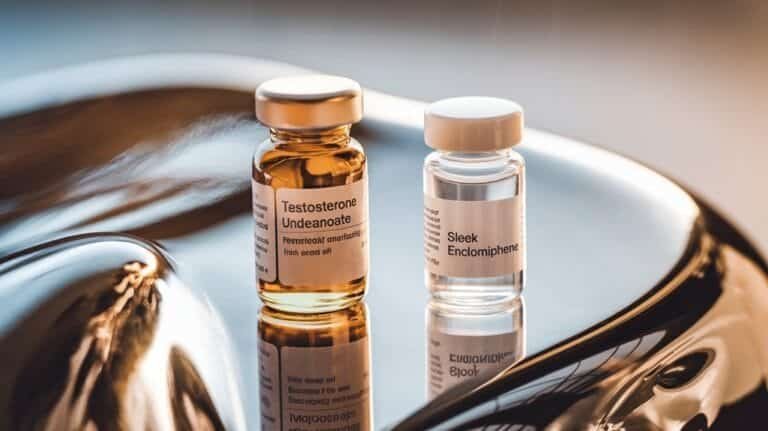How Enclomiphene Works
Enclomiphene operates through a sophisticated mechanism that involves blocking estrogen receptors in the hypothalamus. When these receptors are inhibited, the brain perceives a decrease in estrogen levels, which triggers the release of gonadotropin-releasing hormone (GnRH). This hormone then stimulates the pituitary gland to produce more LH and FSH.
Stimulating Testosterone Production
The increase in these hormones signals the testes to ramp up testosterone production. This natural stimulation of the body’s own hormonal pathways is what sets Enclomiphene apart from TRT, which simply adds testosterone to the system. Moreover, Enclomiphene has been shown to have a favorable impact on sperm production, making it particularly beneficial for men who are concerned about fertility.
Preserving Fertility
By promoting endogenous testosterone production without suppressing spermatogenesis, Enclomiphene allows men to maintain their reproductive capabilities while addressing low testosterone levels. This dual action makes it an attractive option for those who want to improve their testosterone levels without compromising their fertility.
The Benefits of Enclomiphene for Men with Low Testosterone Levels
One of the most significant benefits of Enclomiphene is its ability to restore testosterone levels while preserving fertility. Many men with low testosterone face the dilemma of needing treatment but also wanting to maintain their ability to conceive. Clinical studies have indicated that Enclomiphene can effectively raise testosterone levels in men without causing the testicular shrinkage often associated with TRT.
This means you can experience improvements in energy, mood, and libido without sacrificing your reproductive health. Additionally, Enclomiphene has been linked to improvements in various aspects of male health beyond just testosterone levels. Research suggests that men undergoing Enclomiphene therapy may experience enhanced muscle mass, reduced body fat, and improved overall well-being.
These benefits can lead to a better quality of life and increased confidence. As you consider your options for managing low testosterone, the multifaceted advantages of Enclomiphene make it a compelling choice worth discussing with your healthcare provider.
Potential Side Effects of Enclomiphene

While Enclomiphene is generally well-tolerated, it is essential to be aware of potential side effects that may arise during treatment. Some users report experiencing mild side effects such as hot flashes, headaches, or gastrointestinal discomfort. These symptoms are typically transient and may diminish as your body adjusts to the medication.
However, it’s crucial to monitor your response to the treatment closely and communicate any concerns with your healthcare provider. Another consideration is the potential for elevated estrogen levels due to the hormonal changes induced by Enclomiphene. While the drug primarily acts as an estrogen antagonist in the hypothalamus, some men may experience an increase in estrogen levels as a secondary effect.
This can lead to symptoms such as gynecomastia or mood swings. Regular monitoring of hormone levels during treatment can help mitigate these risks and ensure that you are receiving the most effective and safe dosage.
When comparing Enclomiphene to other testosterone-boosting treatments, such as traditional TRT or human chorionic gonadotropin (hCG), several key differences emerge. TRT involves administering synthetic testosterone, which can lead to rapid increases in testosterone levels but often comes with side effects like testicular shrinkage and decreased sperm production. In contrast, Enclomiphene promotes endogenous testosterone production while preserving fertility, making it a more attractive option for men concerned about reproductive health.
Another alternative is hCG, which mimics LH and stimulates the testes directly to produce testosterone. While hCG can be effective, it may not be as convenient or widely available as Enclomiphene. Additionally, some men may prefer the oral administration of Enclomiphene over injections required for hCG or TRT.
Ultimately, the choice between these treatments will depend on your individual health needs and preferences, making it essential to consult with a healthcare professional who can guide you through the options.
How to Use Enclomiphene Safely and Effectively
| Side Effect | Percentage of Patients |
|---|---|
| Hot flashes | 10% |
| Headache | 8% |
| Insomnia | 5% |
| Abdominal discomfort | 3% |
To use Enclomiphene safely and effectively, it’s crucial to follow a well-defined dosage protocol tailored to your specific needs. Clinical studies have typically employed dosages ranging from 12.5 mg to 25 mg taken daily or every other day. Your healthcare provider will likely recommend starting at a lower dose and adjusting based on your response and hormone levels.
Regular blood tests will help monitor your testosterone and estrogen levels, ensuring that you remain within optimal ranges throughout your treatment. In addition to adhering to the prescribed dosage, maintaining a healthy lifestyle can enhance the effectiveness of Enclomiphene therapy. Engaging in regular exercise, eating a balanced diet rich in nutrients, and managing stress can all contribute to better hormonal balance and overall well-being.
By combining these lifestyle factors with your Enclomiphene regimen, you can maximize its benefits and improve your quality of life.
Enclomiphene: Is it Right for You?
Determining whether Enclomiphene is right for you involves careful consideration of your individual health circumstances and goals. If you are experiencing symptoms of low testosterone—such as fatigue, decreased libido, or mood changes—Enclomiphene may be a suitable option, especially if you are concerned about maintaining fertility. It’s essential to undergo comprehensive testing to confirm low testosterone levels before starting any treatment.
Consulting with a knowledgeable healthcare provider is crucial in making this decision. They can evaluate your medical history, discuss potential benefits and risks, and help you weigh the pros and cons of Enclomiphene compared to other treatment options. By taking an informed approach, you can make choices that align with your health goals and lifestyle.
The Future of Enclomiphene Research and Development

The future of Enclomiphene research looks promising as ongoing studies continue to explore its efficacy and safety profile in various populations. Recent clinical trials have focused on its long-term effects on male fertility and overall health outcomes, providing valuable insights into how this medication can be optimized for different patient needs. As more data becomes available, it may pave the way for broader acceptance and potential FDA approval for treating low testosterone in men.
Moreover, researchers are investigating potential combination therapies involving Enclomiphene alongside other treatments like hCG or lifestyle interventions. This could lead to more personalized approaches that maximize benefits while minimizing side effects. As you stay informed about developments in this area, you’ll be better equipped to discuss emerging options with your healthcare provider and make decisions that best support your health journey.
If you’re interested in learning more about how enclomiphene is related to testosterone levels, you might find the article on telemedicine services useful. Telemedicine has become a crucial tool in managing health treatments remotely, including hormone therapies. To explore more about how telemedicine can facilitate access to hormone treatments and potentially involve medications like enclomiphene, check out this detailed article: Telemedicine for Your Health Needs Wherever You Are. This resource provides valuable insights into how telemedicine is revolutionizing patient care, including for those undergoing testosterone-related treatments.
FAQs
What is enclomiphene?
Enclomiphene is a non-steroidal estrogen receptor modulator that is used to treat low testosterone levels in men.
How does enclomiphene work?
Enclomiphene works by stimulating the production of testosterone in the testes by increasing the release of luteinizing hormone (LH) and follicle-stimulating hormone (FSH) from the pituitary gland.
What are the benefits of using enclomiphene with testosterone?
Using enclomiphene with testosterone can help increase testosterone levels in men with low testosterone, which can lead to improved energy levels, muscle mass, libido, and overall well-being.
What are the potential side effects of enclomiphene?
Common side effects of enclomiphene may include hot flashes, headaches, and nausea. It may also cause visual disturbances in some individuals.
Who can benefit from using enclomiphene with testosterone?
Men who have low testosterone levels due to hypogonadism or other medical conditions may benefit from using enclomiphene to help increase their testosterone levels.
Is enclomiphene safe to use with testosterone replacement therapy?
Enclomiphene is generally considered safe to use with testosterone replacement therapy, but it is important to consult with a healthcare professional before starting any new medication or treatment.






